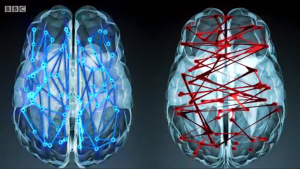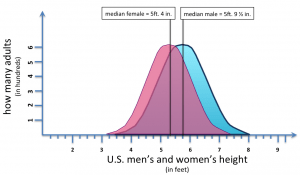Is gender difference innate?
 Earlier this week there was a fascinating Horizon on BBC2 exploring whether there are basic differences betwixt male and female person brains. Horizon is sometimes a little thin on content and large on special furnishings, but this one was different—it was packed with fascinating and compelling information, and presented in a fascinating format. Michael Mosley, of 'Fast Diet' fame, presented the evidence that gender difference was biological in origin, whilst Alice Roberts of 'Coast' and numerous archeology programmes, presented the evidence that differences were the result of conditioning and environment. And the fascinating matter was that both cases seem fairly robust.
Earlier this week there was a fascinating Horizon on BBC2 exploring whether there are basic differences betwixt male and female person brains. Horizon is sometimes a little thin on content and large on special furnishings, but this one was different—it was packed with fascinating and compelling information, and presented in a fascinating format. Michael Mosley, of 'Fast Diet' fame, presented the evidence that gender difference was biological in origin, whilst Alice Roberts of 'Coast' and numerous archeology programmes, presented the evidence that differences were the result of conditioning and environment. And the fascinating matter was that both cases seem fairly robust.
Mosley showtime offered a series examples which both confirmed traditional understandings of difference, and showed that these differences were evident very early in life. Men are, on average, better at spatial tasks, whilst women are, on boilerplate, improve at recognising and understanding emotion in others. Merely is this well-nigh 'hard-wired' brain differences, or are these behaviours learned? Mosley fabricated the prima facie case that the significant differences in the levels of hormones in men and women must surely affect brain evolution, and we heard the 'intuitive' testimony from parents of young children that boys clearly preferred trucks and girls clearly preferred dolls. This was supported by a remarkable experiment with barbary macaque monkeys. When 'boys' and 'girls' toys were distributed in their territory, the male monkeys picked up the trucks and the female monkeys picked up the dolls. No take chances of environment or conditioning affecting that pick!
Mosley then met Simon Baron-Cohen, who is Professor of Developmental psychopathology at the University of Cambridge, and a leading potency on autism. Baron-Cohen's enquiry has demonstrated that exposure to higher levels of testosterone in the womb leads, on the one paw, to the development of greater abilities in what he calls 'systematising' kinds of thinking, and, on the other, lower social skills. It has been demonstrated, for case, that boys develop social skills more slowly than girls—at one year old, boys brand less eye contact with others than girls do.

The transition point in the programme came with the study of Ragini Verma from the University of Pennsylvania, looking at the different forms of connectivity in male and female brains. The differences are quite startling, and support many pop characterisations of differences between men and women.
[They] found greater neural connectivity from front to back and inside one hemisphere in males, suggesting their brains are structured to facilitate connectivity betwixt perception and coordinated action. In dissimilarity, in females, the wiring goes betwixt the left and right hemispheres, suggesting that they facilitate communication between the analytical and intuition.
"These maps bear witness us a stark divergence–and complementarity–in the architecture of the human brain that helps provide a potential neural footing as to why men excel at certain tasks, and women at others," said Verma.
For example, on average, men are more than likely better at learning and performing a single job at paw, similar cycling or navigating directions, whereas women have superior memory and social cognition skills, making them more equipped for multitasking and creating solutions that work for a grouping.
Only these 'connectivity' differences are only nowadays later the teenage years; they are not present in children. And so the question is notwithstanding open up: are these biological, or are they the response of the 'plastic brain' to environmental conditioning?
Alice Roberts then went on to nowadays the evidence for the shaping of gender roles by the environment. Parents adjust to stereotypes when offering babies toys, and systematically assume baby boys will be better at physical challenges than baby girls. Teenagers demonstrate how much their perceptions virtually careers and gender roles are shaped by expectations of lodge and their peers. And enquiry by Gina Rippon at Aston suggests that gender differences are not as big as people often think, nor consistent across cultures.
 And so where does all this get united states of america? At that place is no doubt that environment and cultural factors bear upon men's and women'due south behaviours, expectations, and roles in society. There is also no doubt that, in many contexts, women are treated in a worse way than men are. Research on linguistic communication used in the workplace shows a shocking disparity between how men and women are treated in operation review. So far, then feminist.
And so where does all this get united states of america? At that place is no doubt that environment and cultural factors bear upon men's and women'due south behaviours, expectations, and roles in society. There is also no doubt that, in many contexts, women are treated in a worse way than men are. Research on linguistic communication used in the workplace shows a shocking disparity between how men and women are treated in operation review. So far, then feminist.
Simply there is also fiddling dubiety that any differences are emphasised by culture or nurture, such differences already have a well-established biological basis. This comes dorsum to Mosley'due south opening argument: information technology is just implausible that differences in hormone levels practice non have a significant impact on brain formation, and therefore on cognitive role. I think the most plausible caption for the differences in wiring in adult brains is that it is the result of the surge of hormone levels during the teenage years—which brain evolution as well explains teenagers' need to sleep more.
This raises the question: why is there such reluctance in parts of our guild to allow that men and women might be dissimilar? One of Alice Roberts' opening statements gives the states a clue:
"We alive in a country where fewer than three out of ten physics A levels are taken by girls, where just seven% of engineers are women" she points out, before adding "and where men still earn on average most 20% more than their female person colleagues."
This statement conflates 3 things: departure; equality; and ability. Roberts highlights differences in choice of subject, which leads to the possibility of divergence in equal admission to professions, which then leads to unequal distribution of ability (measured here in earning power) between men and women. Yous just accept to wait at the gender mix of politicians in virtually Western countries to meet evidence of this.
 I call up this presents us with two challenges. The first is whether we can accept and alive with deviation. I am constantly amazed, in discussions of gender difference, how often people brand bones errors in agreement what 'difference' implies. To say 'men are different from women' doesnot mean thatallmen accept one feature andall women take some other. Even Gina Rippon fabricated this basic mistake when she says to Alice Roberts 'If I gave you a encephalon, y'all could not tell whether information technology was the brain of a homo or the brain of a woman.' Of course not—that is not what encephalon difference means. Let'southward take the relatively uncontroversial question of height. Is it true that men are taller than women? Yes. Does that mean that all men are taller than all women? No, of grade not, because in that location is a 'bell curve' spread of heights. If you told me someone'southward height, could I identify whether that person was male or female? No! For the same reason, equal recognition of women'south leadership in the church building does not imply nosotros should see equal numbers of women in leadership roles.
I call up this presents us with two challenges. The first is whether we can accept and alive with deviation. I am constantly amazed, in discussions of gender difference, how often people brand bones errors in agreement what 'difference' implies. To say 'men are different from women' doesnot mean thatallmen accept one feature andall women take some other. Even Gina Rippon fabricated this basic mistake when she says to Alice Roberts 'If I gave you a encephalon, y'all could not tell whether information technology was the brain of a homo or the brain of a woman.' Of course not—that is not what encephalon difference means. Let'southward take the relatively uncontroversial question of height. Is it true that men are taller than women? Yes. Does that mean that all men are taller than all women? No, of grade not, because in that location is a 'bell curve' spread of heights. If you told me someone'southward height, could I identify whether that person was male or female? No! For the same reason, equal recognition of women'south leadership in the church building does not imply nosotros should see equal numbers of women in leadership roles.
It is possible to acknowledge gender divergence without suggesting that all men and women arrange to a narrow stereotype—and I think we need to recognise this. Is it necessarily a problem that 93% of engineers are men? They might well be better at it, because of male brain connectivity.
Only here is the second challenge: how do we value the roles which women might excel in? 1 of the most striking things almost the Apostle Paul'due south discussion of life in the 'body of Christ' in one Cor 12 is the fact that information technology appears to be gender-blind. All who are in Christ take received the Spirit. And the Spirit equips all, regardless of gender, with gifts that contribute to the life of the whole. There is no requirement here for 'sameness'—in fact, that other major theme is differentiation. Each has a different souvenir—just the Spirit enables all to contribute, and we need to value each contribution regardless.
This has real consequences for how nosotros respond to gender differences. When faced with the possibility that men dominate sure roles in society, and these roles are paid more (our society's style of giving value), why is the adjacent assumption 'We need equal numbers of women in that role'? Although that sounds, at first, like the 'feminist' response arguing for gender justice, information technology actually buys in to contemporary culture'due south evaluation of unlike roles. Running a banking company is 'more of import' than nursing the sick, or than raising a family.
Hither's the other possible response: 'Nosotros need to value the roles that women predominate as much as the roles that men predominate.' I tin't assistance wondering that this—at present unarticulated view—needs to have a more prominent place in the discussion.
(If you would similar an entertaining and, for some people, highly offensive have on gender differences, practise spotter The Tale of Two Brains!)
I work freelance. If you take valued this post, would you considerdonating £1.20 a calendar month to back up the production of this blog?
If you enjoyed this, do share information technology on social media (Facebook or Twitter) using the buttons on the left. Follow me on Twitter @psephizo. Like my page on Facebook.
Much of my work is washed on a freelance basis. If you have valued this mail, you can make a single or repeat donation through PayPal:
Comments policy: Good comments that engage with the content of the mail, and share in respectful argue, can add real value. Seek first to understand, then to exist understood. Make the near charitable construal of the views of others and seek to larn from their perspectives. Don't view debate as a conflict to win; address the argument rather than tackling the person.
armstrongsaidgety.blogspot.com
Source: https://www.psephizo.com/gender-2/is-gender-difference-innate/
0 Response to "Is gender difference innate?"
Post a Comment